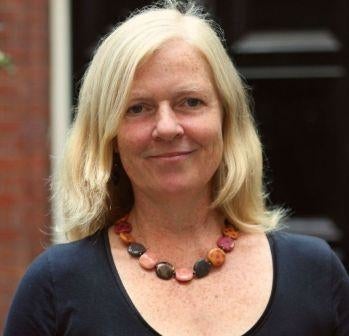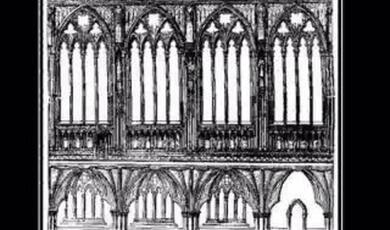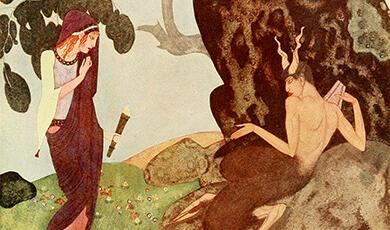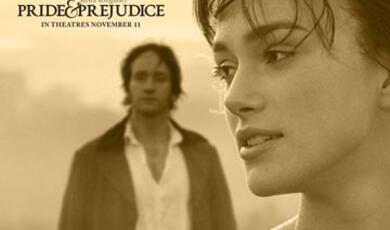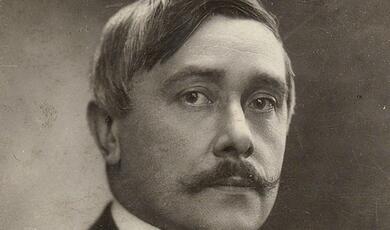Theatre and Language: Samuel Beckett, 'Waiting for Godot'
Share
- Details
- Text
- Audio
- Downloads
- Extra Reading
Beckett's Waiting for Godot has been interpreted in myriad ways. Some claim it is a work that explores the bleak absurdism of human life. Others have argued that it is an allegory of various kinds. These will be explored, but also the question as to what is it about the play that lends itself to such diverse interpretations? Plays are more than language. Is it in the relationship between language and the other aspects of theatre craft that the most convincing interpretation of the play lies?
Download Text
12 April 2016
Theatre and Language: Samuel Beckett, Waiting for Godot
Professor Belinda Jack
The central character of this play, it could be argued, remains absent throughout; in fact he may not exist. But he lives on in our language, independent of both the author and the play. Godot has been likened to Dracula – both have been described as ‘pop culture ghosts’. [Kim Newman, interviewed in 1992, Open Book, BBC Radio 4, 22 January 2009, cited by Mary Bryden’s Preface to Beckett’s Waiting for Godot, Faber 2010, hereafter G] He re-appears in myriad literatures – from medical texts to advertisements for jobs, cars, cosmetics and so on. Interestingly, he is particularly prominent in medical literature. Here are some examples: ‘“Waiting for Godot”: A Commonsense Approach to Medical Treatment of Endometriosis’ (where part of the womb lining is found outside the womb), ‘Waiting for Godot: The Anxiety Created By Diagnostic Medical Testing’, ‘Underestimating The Impact of “Waiting for Godot” (and A Doctor’s Call)’ and so on. Political cartoonists are also keen on Godot.
So, ‘Godot’, a character, has entered the language and the expression, ‘Waiting for Godot’ has become a common idiom. And situations regularly crop up in daily life that are described as ‘Beckettian’. Alan Schneider, the director whom Beckett probably most admired, claimed that Godot was ‘no longer a play, but a condition of life’. This represents another step from the name and the idiom. The play is now proposed as a ‘condition of life’, a philosophical description of our ‘being in the world’.
These facts say something very powerful about a play that is often described as ‘difficult’. By rights, you might suppose, the play might have survived as a little-known, recherché cult piece. But no.
The origins of the play were as unlikely as inauspicious. Beckett wrote it (initially in French and then in English) as a diversion from the trilogy which consists of Molloy, Malone Dies, and The Unnameable. He was struggling with these prose works and the play was an escape, or at least a welcome change. He described it 'as relaxation, to get away from the awful prose I was writing at the time’. He wrote the play in roughly four months. Bringing it to birth on stage was a much more protracted and painful process as I’ll describe in a moment.
Most of you will know the play, but in case some of you don’t, can it be briefly summarised? I don’t think so – so let us have a go! The rhetorical device I have used here, put simply, statement, followed by contradiction, is typically ‘Beckettian’. Exchanges between Vladimir and Estragon are frequently simply antiphrasis. Here is an example:
V: Ah yes, the two thieves. Do you remember the story?
E: No.
V: Shall I tell it to you?
E: No.
V: It’ll pass the time. [Pause] Two thieves..., crucified...
So can the play be briefly summarised? I do not think so. Here goes...
‘Nothing to be done’; the play opens with a quasi-bathetic line. ‘Bathos’ is the rhetorical device that pulls the rug out from under you. Its effect is one of anticlimax created by a lapse in mood from the sublime to the trivial or ridiculous. I will say a little more about the prevailing theatrical conventions of the time in a moment, but even without the context it is obvious that a play should seek to draw its audience in and convey a sense that a drama is about to unfold. This line, ‘Nothing to be done’ subverts all those expectations. And the audience is soon aware of the absence of a plot too. Rather we are faced with an apparently inert situation in which the audience waits for action, just as the two tramps wait for something to happen, sometimes finding ways to ‘pass the time’. The play is riddled with the expression, and the audience begins to question what it means. Isn’t all life a matter of ‘passing the time’? Just as we have a sense of stasis (in time), so we have a sense of an anonymous location, in terms of place. The stage directions read: ‘A country road. A tree. Evening.’ The use of the indefinite article, ‘a’, has a generalising effect. All is ‘indefinite’. On this bare stage are two tramps, Vladimir and Estragon. Their conversation, insomuch as what one says engages with what the other has said is mundane, but because their language is simple – that is made up of high-frequency words, words used all the time in everyday speech, and common idioms – it can, paradoxically, often resonate with something that goes far beyond the mundane. The first line is typical: ‘Nothing to be done’. In the original French version the line is ‘Rien à faire’. This could be variously translated as, ‘It’s no good’, ‘It’s no use’, ‘There’s nothing for it’ or ‘Nothing to be done (about it)'; the last is what Beckett opted for. The pronoun ‘it’, is free floating. That is to say it does not function as a pronoun should in the sense that there is no preceding noun. The ‘it’ might refer to the action of removing his boot, so ‘It’s hopeless trying to get my boot off’. But pared down to ‘Nothing to be done’, the line takes on an equally abstract and philosophical resonance, ‘There’s nothing to be done in life, about life’. This is a declaration of philosophical pessimism of the utmost seriousness. So the single first line is both a statement about the impossibility of removing a boot – what could be more humdrum? – and a declaration of nihilistic despair – what could be more darkly profound?
Do we have, in effect, to opt for one or the other, or do we have to accept the uncomfortable ‘truth’ of both? Next year, my fourth year as Professor of Rhetoric, I will be exploring various features of rhetoric – the art of persuasion – in relation to various classic literary works. One rhetorical trope that we will be thinking about, is metaphor. Metaphor, by definition, brings two things into relationship; both co-exist linguistically. Shakespeare’s, ‘All the world’s a stage’ (As You Like It) is one of the most cited metaphors in the English language. Here the world is likened to a stage, suggesting that life and theatre are one and the same. We can understand the opening of Godot in much the same way: the frustrations of not being able to remove a boot is a metaphor for the ultimately insurmountable frustrations of life. We do not ‘opt’ for a single meaning but are invited, consciously or not, to accept this overlap of quasi-metaphorical meaning. Some linguistic theorists suggest that language is by its very nature metaphorical. But I’m jumping ahead of myself. Metaphor is for next year! Back to Beckett’s play.
After the boot ‘turn’, we soon learn that the two characters on the stage are waiting for a character named Godot. And while waiting, passing the time, two other characters appear – the domineering Pozzo whip in hand, and Lucky, his servant, who has a rope tied around his neck and who is heavily burdened with all their baggage. The relative equality of Vladimir and Estragon's relationship contrasts with the unequal relationship between Pozzo and Lucky, rather one of master and slave. Conversations continue, including a long, rambling, incoherent speech by the otherwise silent Lucky; Pozzo and Lucky then leave the stage. Moments before the first act ends, a boy appears. He informs them that Godot won’t be coming that day but ‘surely tomorrow’. Again the apparently simple expression ‘surely tomorrow’ is ambiguous. Although the adjective ‘sure’ can mean ‘certain’, the adverbial expression weakens the certainty and means only something like ‘most likely’. There is even a sense that the speaker who expresses the notion is himself unsure! After the boy has left, Vladimir and Estragon decide to leave also. But the act ends with a typical antiphrasis: ‘Yes, let’s go’. But the stage direction answers back, ‘They do not move. Curtain’. And so the first of the two acts of this remarkable two act play closes.
In the second act there is an uncanny sense of near-repetition of both speech and action. There is waiting, ‘conversation’, and Pozzo, Lucky and the Boy reappear. But this time Pozzo has become blind, and Lucky is dumb. After they have left the boy arrives and delivers a similar message about Godot’s likely appearance. Vladimir and Estragon discuss suicide. For want of a rope they postpone their suicides until the following day, ‘Unless Godot comes’, Vladimir adds. And Estragon then asks, ‘And if he comes?’ to which Vladimir answers ‘We’ll be saved.’ The act – and play – ends as the first act did. Estragon says, ‘Yes, let’s go’, and the stage directions read, ‘They do not move’. And so the play comes to a close.
Well, how do we begin to make sense of this play which, in the words of one critic:
“[Waiting for Godot] has achieved a theoretical impossibility—a play in which nothing happens, that yet keeps audiences glued to their seats. What's more, since the second act is a subtly different reprise of the first, he has written a play in which nothing happens, twice.”
― Vivian Mercier Irish literary critic
We can begin with the play as text, before considering it as event, that is as a performance that is unique and ephemeral; that is a one-off happening. Beckett’s theatre, like all theatre, is not just words, but a brilliant juxtaposition of word, gesture and silence. In Beckett’s theatre there are often contradictions between these various communicative and non-communicative human activities as in the ending of both acts where speech suggests action – ‘let’s go’ – and the stage direction describes stasis – ‘They do not move’. And silence, the absence of language and sound (created by movement), communicates too. It signals a break-down of ‘train of thought’ (an interesting metaphorical expression), of communication, of ideas. One might even say that Beckett created his own kind of silence. The critic Normand Berlin describes this very well, ‘Godot makes silence as important as dialogue – not only the kind of silence that comes to us all in everyday life, or the silence of the characters in their anguish, but a peculiarly Beckettian silence, the presence of an absence that is palpable, touching the heart of existence, as if in the beginning was the Silence, then came the Word, then the Silence again.’ Perhaps Berlin, with his allusions to the Creation story in Gospel of John, gets a little carried away here but his point is that Waiting for Godot, at least when well-produced, makes something of silence in a way that no other play I know does. Silence begins to represent absence, negation, stasis, and these suggest - or become metaphors for - philosophical pessimism.
I think this can be illuminated by reference to the artist Giacometti’s insight into the play. Giacometti is variously described as an Expressionist, Surrealist, Cubist and Formalist. But what matters in relation to Beckett is that he too moved away from naturalistic forms of representation. He and Beckett were friends and Giacometti designed the tree for a 1961 production in Paris.
Giacometti’s figures are stick-like forms.
It is obvious why Beckett thought to ask Giacometti to create a tree for his play. We now know – we did not in the 50s – that humans and trees share some 60% of their DNA in common. Looking at Giacometti’s figures and his tree, this comes across. We are all but living matter – that will die. The tree will die – and Vladimir and Estragon may die – by the tree. It is, after all, suicide by hanging – from the tree – that they contemplate in the play.
Giacometti sculpted the human form almost compulsively, but said that he wasn’t sculpting the human figure, ‘but the shadow that is cast’. This idea of form and shadow seems to me to be a corollary of Beckett’s speech and silence. Both are presences which contrast with an absence which is also a trace of a presence.
http://www.newyorker.com/culture/culture-desk/is-that-o-k-mr-beckett
Before we consider the play as event, I’d like to say a few words about the writerly context. The text itself is at once simple and deeply puzzling. What can the performance context tell us – if anything?
On the day that Beckett first put pen to paper, Saturday 9 October 1948, the London theatre scene had various showings on offer by established playwrights like George Bernard Shaw and Terence Rattigan, and relative new-comers like Tennessee Williams (The Glass Menagerie). And around the same time as Beckett’s play was first performed in London in 1955, John Osborne’s, Look Back in Anger, and O'Neill's great work of realistic theatre, Long Day's Journey into Night were being staged. The action takes place in a single day, in August 1912 at the seaside home in Connecticut belonging to the Tyrones. The play is in part about the chaos caused by addiction. The characters dissimulate, recriminate, accuse and deny. There are also moments of affection, hope and solace. The work is one of high emotion and psychological realism at a very considerable remove from Beckett’s work.
So much for the performance context which tells us little about Waiting for Godot other than its extreme originality, even iconoclasm.
So how was the play first received and what insights does this provide?
In France, the play benefited from a radio broadcast of an abridged version in the run up to its first stage performance in 1953. This advance publicity played a part in encouraging Editions de Minuit to publish the play in 1952. When the play finally premiered in 1953 – three years after Roger Blin had cautiously agreed to perform it – the critics and public already had some sense of this enigmatic work. The venue was the Théâtre de Babylone, a small theatre of just 220 seats – roughly the size of this auditorium. The stage was 20 feet wide – smaller than this stage! The first performances were met with bemusement, a lack of appreciation of any potential humour and early exits from the auditorium. But influential critics – intellectuals and writers like the playwright Jean Anouilh, academic and novelist Alain Robbe-Grillet, and playwright, poet and novelist Jacques Audiberti – rallied to support Beckett and Roger Blin, the producer, in their remarkable endeavour. So in the end the first run went well.
In the UK, likewise, it was the critics who were impressed and the public less so. It premiered at the Arts Theatre Club. The text, however, had suffered from the Lord Chamberlain’s censorship. Religious and sexual allusions had been excised. Suicide by hanging remained a crime at the time. Beckett was dismayed by the manner in which his play had been bowdlerised, writing to his friend the publisher Barney Rosset: ‘His incriminations are so preposterous that I’m afraid the whole thing is off. […] The things I had expected and was half prepared to amend (reluctantly), but also passages that are vital to the play […] and impossible either to alter or suppress.’
What of the autobiographical and historical moment – broadly defined?
Beckett and his partner Suzanne had had to hide in the unoccupied zone of southern France. The occupation had been a time of anxiety and uncertainty about their lives in France. Although there was a certain post-Occupation euphoria that manifested itself particularly in the cities, and Paris most notably, there were shortages and a sense of political instability. Miners’ strikes in the north had been aggressively suppressed by French riot police using tear gas. Workers in France’s power stations were also striking, reducing electrical output by 50% with a likelihood of fuel rationing.
The relationship between the contemporary moment and the play is not a straightforward one, but the presence of violence, of food shortages, of uncertainty are all features of both the times and the play.
And in terms of mood, Beckett was pessimistic.
This emerges very obviously from the prose works that Beckett had taken a break from in order to work on the play. Some quotations from those works will, I hope, suffice to make the point.
Molly
Don't wait to be hunted to hide, that's always been my motto.
To restore silence is the role of objects.
To him who has nothing it is forbidden not to relish filth.
Yes, there were times when I forgot not only who I was, but that I was, forgot to be.
Malone Dies
Nothing is more real than nothing.
He who has waited long enough, will wait forever. And there comes the hour when nothing more can happen and nobody more can come and all is ended but the waiting that knows itself in vain.
The Unnameable
I, of whom I know nothing, I know my eyes are open, because of the tears that pour from them unceasingly.
Yes, in my life, since we must call it so, there were three things, the inability to speak, the inability to be silent, and solitude, that’s what I’ve had to make the best of.
The rhetorical figure of allegory is sometimes described as extended metaphor where certain equivalences last throughout the work. A remarkably large range of allegories have been proposed for Godot from the political to the psychological, from the philosophical to the homoerotic, and theological.
We have not got time to explore these at any length but it is important for my argument to consider some of them. Politically, the play has been proposed as an allegory of the Cold War, the Resistance in France and the Irish Problem. In all these it is a matter, crudely speaking, of the confrontation of the powerful – Pozzo (and Lucky) - and the powerless, Vladimir and Estragon.
Both Freudian and Jungian interpretations have also been proposed. Freud’s triple psyche – the ego, the id, and the superego – have been understood (e.g. by the critic Dukore) as the characters in terms of what they lack. So Gogo (Estragon’s pet name) is the (E)go-(e)go, Didi (Vladimir), the (D)id(i)d), and Pozzo, the superego. Pozzo and Lucky are duplications of Estragon and Vladimir. Thus Dukore concludes that the play is a metaphor for the pointlessness of existence where salvation is awaited by an external force and the self is incapable of self-knowledge.
Jung proposed a quadruple soul, paired in twos – the ego and the shadow, and the persona and the soul’s image (animus or anima). The shadow contains emotion repressed by the ego. Lucky is, in this schema, the shadow of the dominant, egocentric Pozzo. Lucky’s monologue in Act 1 is a pouring forth of his repressed unconscious. Estragon’s name has been proposed as a cognate (that is closely related linguistically) of oestrogen (the female hormone) and his personality is thus explicable in terms of the feminine – poetic, sensitive, irrational. Vladimir, by contrast, is the masculine one – rational, intellectual, and contemplative.
Philosophical interpretations have been numerous – existential (Kierkegaard and Camus), absurdist (Esslin) and ethical. The last is perhaps most in need of elaboration. Godot represents compassion and will not come until the characters behave ethically. No one shows concern when the characters behave violently and so Godot’s appearance is postponed. Only if they abandon their hardened hearts will they be able to pursue purposeful lives.
The numerous biblical references, including the story of the two thieves and the tree as representative of the cross, have all been seen as religious allegory. Some then take a further step and claim that Godot is God. Beckett denied this and given that the play was first written in French – Godot is not the French for God – this seems far-fetched and reductive.
Claims for the play’s homoeroticism depend on the fact that the cast is all male, on the loving relationship between Vladimir and Estragon – with talk of an idea for a honeymoon – and Estragon sucking on the carrot. My view is that the absence of women means that there is no potential for new birth and a sense of renewal that might come with it.
A more recent and persuasive philosophical reading is provided by Leo Bersani who explores the idea of art as part of a ‘culture of redemption’. The repetition of certain experiences in art bring meaning and humanity to otherwise meaningless experiences. The value of negative images is transmuted into its opposite.
These allegories are proposed on the basis of the text of the play. But the text is simply a starting point for a performance that communicates in myriad ways – not just through language – and silence. As an author Beckett has been categorized in myriad ways – as modernist, absurdist, and existentialist. But in many ways in Godot what can be made to dominate in production is a remarkable classicism in terms, above all, of balance.
The play is in two acts; three-act and five-act plays have a shape that allows for resolution in the final act. Two acts balance but repeat, rather than resolve. The characters belong in two pairs: Vladimir and Estragon, Pozzo and Lucky. In terms of stagecraft, most productions make much of light and dark. In fact many are monochrome and colourless – black and white. The characters are either up – on their feet – or down, sitting or on their knees. There is even a vertical contrast between Vladimir, who is more intellectual, and plays with a hat (head) and Estragon, who is more instinctive and childish and plays with his boots (feet). Balance underscores the dialogue, hence the frequency of antiphrasis constituting exchanges between the characters.
The mood is either up-beat, however strained, or despairing.
Further, the play avoids the theatre’s usual linguistic richness. The dialogue is often fragmentary, exploiting stichomythia (sequences of single alternating lines, or half-lines (hemi stichomythia), or two-line speeches (distichomythia).
Beckett termed the English version of the play a tragi-comedy – a balance of comedy and tragedy. And this sense of balance that is shot through so many dimensions of the play, leaves the audience in a state of anticipation that is never answered. Beckett once claimed that his favourite word was ‘perhaps’! When Beckett was awarded the Nobel Prize for Literature in 1969, part of the speech made in his honour stated: ‘He has transmuted the destitution of modern man into his exaltation’; destitution and exultation presented in perfect balance.
Beckett , who was brought up a Christian – often quoted St Augustine. The familiar statement, ‘Do not despair, one of the thieves was saved; do not presume, one of the thieves was damned.’ For Vladimir, within the play, a fifty-fifty chance is ‘a reasonable percentage’.
When Beckett was asked by Alan Schneider, ‘Who is Godot’, he answered, ‘If I knew I would have said so in the play’. And when people speculated, in conversation with the playwright, about its ‘meaning’, Beckett would reply simply, ‘Why people have to complicate a thing so simple I can’t make out.’
Do we take him at his word, or feel infuriated that he remains so obtuse and tantalising. I think we take him at his word. What Waiting for Godot is about, in my view, is the comic, but equally tragic, human need for ‘meaning’. As soon as language is pared down to it high-frequency lexis, and action is limited, and the stage is almost bare, our tendency is to ‘read’ the aspects of theatre as symbolic. And then to ask, what are they symbolic of? The tree is no longer a tree. Godot is no longer a mystery we can live with, but a mystery we feel an urgent need to solve. Beckett, when asked to compare literature and music always deemed that music ‘won out’. And music does not ‘mean’.
Beckett is not the only author to resist interpretation. One of the most succinct articulations of this is Archibald MacLeish’s 1926 poem, ‘Ars Poetica’ (the art of poetry):
A poem should be palpable and mute
As a globed fruit,
Dumb
As old medallions to the thumb,
Silent as the sleeve-worn stone
Of casement ledges where the moss has grown—
A poem should be wordless
As the flight of birds.
*
A poem should be motionless in time
As the moon climbs,
Leaving, as the moon releases
Twig by twig the night-entangled trees,
Leaving, as the moon behind the winter leaves,
Memory by memory the mind—
A poem should be motionless in time
As the moon climbs.
*
A poem should be equal to:
Not true.
For all the history of grief
An empty doorway and a maple leaf.
For love
The leaning grasses and two lights above the sea—
A poem should not mean
But be.
In my next and final lecture of this three-year cycle on ‘The Mysteries of Reading and Writing’, I will be exploring Tom Stoppard’s play The Real Thing. Stoppard, like almost every playwright after Beckett greatly admired the author of Waiting for Godot. And the obvious debts to Beckett in later playwrights’ work also help to illuminate the originality of Godot. Stoppard claimed that Beckett ‘liberated something for anybody writing plays’. And the American, Edward Albee, claimed: ‘if a playwright is uninfluenced by Samuel Beckett, then he is a damn fool or irresponsible’.
So before we move on to questions, I’d like to show two clips from two very different productions of the play. The first is from a 2001 film of the play. The second is from Sean Mathias’s 2013 production.
Beckett On Film Waiting For Godothttps://www.youtube.com/watch?v=kXmdTUfsfmI (beginning to 5 mins)
A first look at Waiting For Godot
https://www.youtube.com/watch?v=MUXtzkLTABI (beginning to end (1.39))
After questions we’ll hear the beginning of Schubert's Die Winterreise, one of the playwright’s great favourites. Beckett wrote, ‘To find a form that accommodates the mess, that is the task of the artist now’. Words might fail, but music, he contended, never did.
© Professor Belinda Jack, 2016
i Normand Berlin, ‘Traffic of our stage: Why Waiting for Godot?’, The Massachusetts Review; Amherst; Autumn 1999.
ii Colin Duckworth (ed.), En Attendant Godot, (London: Harrap, 1966), p.xlv.
This event was on Tue, 12 Apr 2016
Support Gresham
Gresham College has offered an outstanding education to the public free of charge for over 400 years. Today, Gresham College plays an important role in fostering a love of learning and a greater understanding of ourselves and the world around us. Your donation will help to widen our reach and to broaden our audience, allowing more people to benefit from a high-quality education from some of the brightest minds.


 Login
Login
